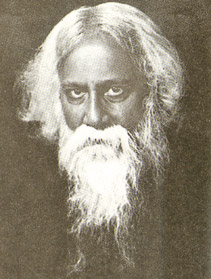Tagore's fame took him across continents
Rabindranath Tagore (1861-1941) was the youngest son of Debendranath
Tagore, a leader of the Brahmo Samaj, which was a new religious sect in
the 19th century Bengal . He was educated at home. At 17 he was sent to
England for formal schooling, but he did not finish his studies there.
In his mature years, in addition to his literary activities, he managed
the family estate, a project which brought him into close contact with
humanity and increased his interest in social reform.
 He also started an experimental school at Shantiniketan where he
tried his Upanishadic ideals of education. From time to time he
participated in the Indian nationalist movement, though in his own
non-sentimental and visionary way; and Gandhi, the political father of
modern India , was his devoted friend. Tagore was knighted by the ruling
British Government in 1915, but within a few years he resigned the
honour in protest against British policies in India. He also started an experimental school at Shantiniketan where he
tried his Upanishadic ideals of education. From time to time he
participated in the Indian nationalist movement, though in his own
non-sentimental and visionary way; and Gandhi, the political father of
modern India , was his devoted friend. Tagore was knighted by the ruling
British Government in 1915, but within a few years he resigned the
honour in protest against British policies in India.
Tagore had early success as a writer in his native Bengal. With his
translations of some of his poems he became rapidly known in the West.
His fame took him across continents on lecture tours and tours of
friendship. For the world he became the voice of India's spiritual
heritage; and for India, especially for Bengal , he became a great
living institution.
Although Tagore wrote successfully in all literary genres, he was
first of all a poet. Among his 50 odd volumes of poetry are Manasi
(1890) [The Ideal One], Sonar Tari (1894) [The Golden Boat], Gitanjali
(1910) [Song Offerings], Gitimalya (1914) [Wreath of Songs], and Balaka
(1916) [The Flight of Cranes]. The English renderings of his poetry,
which include The Gardener (1913), Fruit-Gathering (1916), and The
Fugitive (1921), do not generally correspond to particular volumes in
the original Bengali; and in spite of its title, Gitanjali: Song
Offerings (1912), the most acclaimed of them, contains poems from other
works besides its namesake. Tagore's major plays are Raja (1910) [The
King of the Dark Chamber], Dakghar (1912) [The Post Office], Achalayatan
(1912) [The Immovable], Muktadhara (1922) [The Waterfall], and
Raktakaravi (1926) [Red Oleanders]. He is the author of several volumes
of short stories and a number of novels, among them Gora (1910),
Ghare-Baire (1916) [The Home and the World], and Yogayog (1929)
[Crosscurrents]. Besides these, he wrote musical dramas, dance dramas,
essays of all types, travel diaries, and two autobiographies, one in his
middle years and the other shortly before his death in 1941. Tagore also
left numerous drawings and paintings, and songs for which he wrote the
music himself.
He was awarded the Nobel Prize in Literature in 1913 "because of his
profoundly sensitive, fresh and beautiful verse, by which, with
consummate skill, he has made his poetic thought, expressed in his own
English words, a part of the literature of the West."
Tagore modernised Bengali art by spurning rigid classical forms and
resisting linguistic strictures. His novels, stories, songs,
dance-dramas, and essays spoke to topics political and personal.
Gitanjali (Song Offerings), Gora (Fair-Faced), and Ghare-Baire (The Home
and the World) are his best-known works, and his verse, short stories,
and novels were acclaimed-or panned-for their lyricism, colloquialism
and naturalism.
From Nobel Lectures, Literature 1901-1967, Editor Horst Frenz,
Elsevier Publishing Company, Amsterdam , 1969 |


